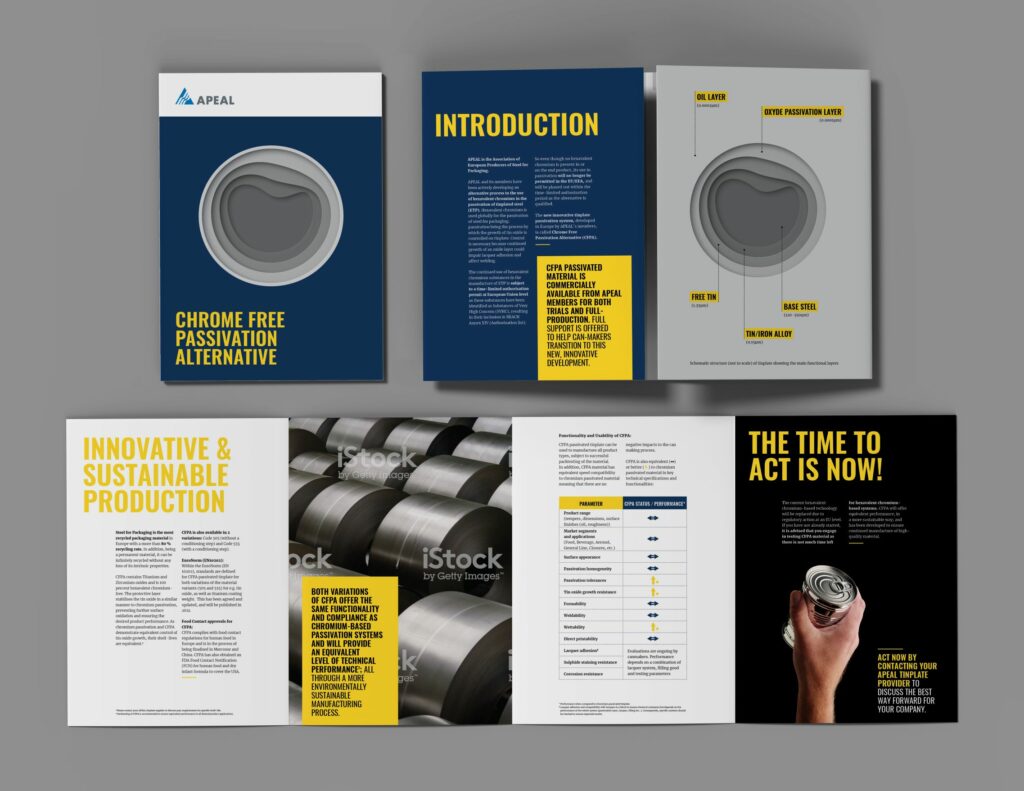#29.11.2021 Hexavalent chromium-free passivation alternative is ready for adoption
By Alexis Van Maercke, Secretary General.
 Some hexavalent chromium compounds have been designated as Substances of Very High Concern in the EU. As a result, they were placed on the REACH Authorisation list, meaning that their use is subject to time-limited review with the ultimate aim to remove them from all uses while allowing for a transition to alternative technologies, including in the manufacturing process of tinplate.
Some hexavalent chromium compounds have been designated as Substances of Very High Concern in the EU. As a result, they were placed on the REACH Authorisation list, meaning that their use is subject to time-limited review with the ultimate aim to remove them from all uses while allowing for a transition to alternative technologies, including in the manufacturing process of tinplate.
Hexavalent chromium is used globally for the passivation of steel for packaging; passivation being the process by which the growth of tin oxide is controlled on tinplate. Even though no hexavalent chromium is present in or on the end product; and its use is strictly controlled by APEAL members to protect worker safety and the environment, this passivation technology will be phased out in the EU as new technologies are adopted.
This of course has a direct impact on steel packaging manufacturing, and APEAL members have been working to identify replacement candidates for several years.
 The result of this work is CFPA (Chromium Free Passivation Alternative), an innovative, food contact compliant tinplate passivation system that has been in commercial production since 2019. It is 100% hexavalent chromium-free and offers the same functionality as chromium-based passivation systems but with a more environmentally sustainable manufacturing process which directly addresses the challenges posed by the REACH regulation.
The result of this work is CFPA (Chromium Free Passivation Alternative), an innovative, food contact compliant tinplate passivation system that has been in commercial production since 2019. It is 100% hexavalent chromium-free and offers the same functionality as chromium-based passivation systems but with a more environmentally sustainable manufacturing process which directly addresses the challenges posed by the REACH regulation.
How does it work?
A passivation process is necessary to prevent the growth of a tin oxide layer that could impair lacquer adhesion and affect welding.
Through CFPA, which is applied onto the tin, the protective layer stabilises the tin oxide in a similar way to traditional chromium passivation, preventing further surface oxidation and maintaining product performance.
The use of CFPA will not adversely affect the shelf life of products packaged in steel, which can keep food safe and preserve nutrients longer than any other packaging.
Next steps
CFPA is commercially available and is currently undergoing qualification pack-testing with can-makers. Moreover, APEAL has engaged with the standardisation bodies and authorities to ensure that CFPA is included in all the relevant global standards.
The EuroNorm, EN 10202, will be updated to include CFPA specific information in the passivation section and it is expected this version will be released in 2022.
APEAL has also been in close contact with the representatives of the ASTM committee responsible for the update of the relevant ASTM standards. These discussions are on-going and a reference to CFPA will be included in a future update.
On a more global level, APEAL has proposed a modification to the ISO 11949 to include a specific reference to CFPA.
Find out more
CFPA passivated material has been commercially available for can-makers’ trials and production since 2019.
This is a huge, collective challenge for the entire steel for packaging value chain. APEAL and its members are ready to lead and assist in the transition to this innovative alternative, supporting can-makers during long-term pack-tests and potential lacquer developments.
Pack-testing, especially in the food segment, can be a lengthy process, so APEAL encourages can-makers to act now.
Download the brochure

